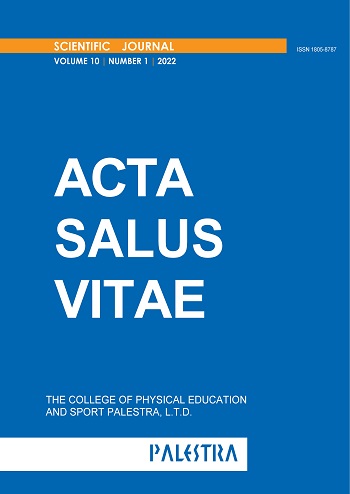Influence of the microbiome on the quality of human life
DOI:
https://doi.org/10.58743/asv2022vol10no1.310Keywords:
health, quality of life, microbiomeAbstract
The World Health Organization defines human health as physical, mental and social well-being. However, the contemporary challenges of health care systems in the world, dedicated to various health problems, are more and more often characterized by a holistic approach to health. Therefore, they require many definitions of health in various aspects of maintaining health and the pursuit of health. Health is the physiologically correct functioning of systems and organs, and the ability to maintain it is an active process involving distinct adaptive mechanisms that coordinate interactions between the body's systems and organs. Homeostasis is the body's ability to maintain health and the proper functioning of the body in the face of changing external or internal factors. One is the human microbiome, which is made up of microbes that make up a biocenosis, which can vary from person to person. Various types of microflora inhabit the human skin, mouth, nose and intestines, playing a role in the immune system and human metabolism. The literature review shows the relationship between the human microbiome and nutritional needs, metabolic rate and other measures of health. Research in this direction will contribute to the identification of ways to modify lifestyle elements in order to prevent civilization diseases.
References
Ayres JS. The Biology of Physiological Health. Cell. 2020; 181(2):2 50-269. DOI: 10.1016/j.cell.2020.03.036.
Binek M. Mikrobiom człowieka – zdrowie i choroba. Postępy Mikrobiologii. 2012; 51: 27-36.
Binek M. Znaczenie jelitowych mikrobiontów w utrzymaniu ogólnej homeostazy gospodarza. Postępy Mikrobiologii. 2015; 54(3): 207–216.
Evrensel A, Ceylan ME. Fecal Micriobiota Transplantation and Its Usage in Neuropsychiatric Disorders. Clinical Psychopharmacology and Neuroscience. 2016; 231-237.
Foster JA, Rinaman L, Cryan JF. Stress & the gut-brain axis: Regulation by the microbiome. Neurobiology Stress. 2017; 7: 124-136.
Gliński Z, Kostro K. Mikrobiom – charakterystyka i znaczenie. Życie Weterynaryjne. 2015; 90(7): 446-450.
Heiman ML, Greenway FL. A healthy gastrointestinal microbiome is dependent on dietary diversity. Molecular metabolism. 2016; 5(5):317-320. DOI: 10.1016/j.molmet.2016.02.005
Jandhyala SA, Talukdar R, Subramanayam C. et al. Role of the normal gut microbiota. World Journal Gastroenterol. 2015; 8787-8803.
Kinsner M, Kazimierska A. Programowanie metaboliczne. Postępy Nauk o Zdrowiu. 2018; 2: 5-18.
Kinsner M. Programowanie metaboliczne. Praca licencjacka (niepublikowana). Wyższa Szkoła Rehabilitacji. Warszawa. 2018.
Leonardi F. The Definition of Health: Towards New Perspectives. International Journal of Health Services. 2018; 48(4): 735-748. DOI: 10.1177/0020731418782653.
Malfertheiner P. Zaburzenia mikrobioty w chorobie uchyłkowej. XVII Kongres Polskiego Towarzystwa Gastroenterologii. 22-24 września 2016. Poznań.
Mroczyńska M, Libudzisz Z, Gałęcka M, Szachta P. Gut microorganisms and their metabolic activity. Gastroenterology Review/Przegląd Gastroenterologiczny. 2011; 6(4): 218-224. doi:10.5114/pg.2011.24304.
Najwyższa Izba Kontroli. Nadzór nad stosowaniem dodatków do żywności, lata 2016-2018 (I kwartał). Warszawa. 2018.
Rakowska M, Lichosik M, Kacik J, Kalicki B. The impact of the microbiota on human health. Pediatria i Medycyna Rodzinna. 2016; 12(4): 404-412. DOI: 10.15557/PIMR.2016.0040.
Saulnier DM , Ringel Y, Heyman MB, Foster JA, Bercik P, et al. The intestinal microbiome, probiotics and prebiotics in neurogastroenterology. Gut Microbes. 2013; 4(1): 17-27. DOI: 10.4161/gmic.22973.
Sirisinha S. The potential impact of gut microbiota on your health: Current status and future challenges. Asian Pacific Journal of Allergy and Immunology. 2016; 249-264.
Skrzydło-Radomańska B. Nowe dowody w IBS i rola mikrobioty. XVII Kongres Polskiego Towarzystwa Gastroenterologii. 22-24 września 2016. Poznań.
Strzępa A, Szczepanik M. Wpływ naturalnej flory jelitowej na odpowiedź immunologiczną. Postępy Higieny Medycyny Doświadczalnej. 2013; 67: 908-920. DOI:10.5604/17322693.1064563
Szewc M. Badania nad mikrobiotą jelitową i metodami jej modyfikacji w ujęciu historycznym. Acta Medicorum Polonorum. 2017; 7(2); 54-62. DOI: 10.2883/jamp.2017.10.
Wołkowicz T, Januszkiewicz A, Szych J. Mikrobiom przewodu pokarmowego i jego dysbiozy jako istotny czynnik wpływający na kondycję zdrowotną organizmu człowieka. Medycyna Doświadczalna i Mikrobiologia. 2014; 66(3): 223 – 235.
Young VB. The role of the microbiome in human health and disease: an introduction for clinicians. BMJ. 2017; 356: 831. DOI: 10.1136/bmj.j831.
Downloads
Published
How to Cite
Issue
Section
License
Authors publishing in this journal agree to the following terms:
Authors retain copyright and grant the journal the right of first publication, while the work is also licensed under the Creative Commons Attribution License, which allows others to share this work acknowledging its author and initial publication in this journal.
Authors are permitted to enter into separate, additional contractual arrangements for the non-exclusive distribution of the work in the version published in the journal (for example, to publish it in a book), with an acknowledgement of its initial publication in this journal.
Authors are allowed and encouraged to share their work online (for example, on their websites) before and during the editorial process of their contribution, as such a practice can lead to productive exchanges of ideas and also earlier and higher citation of the published work (See the Open Access Effect).


